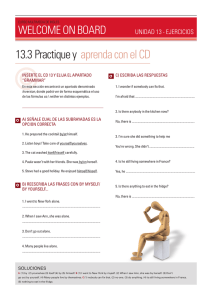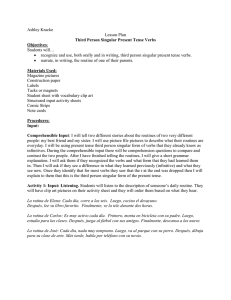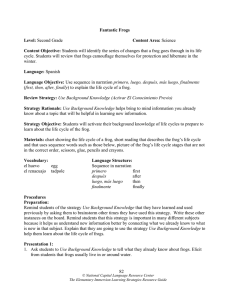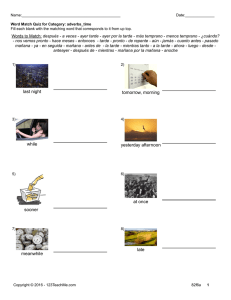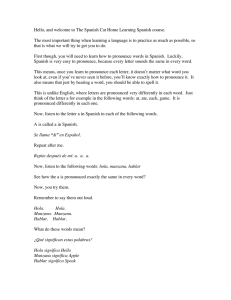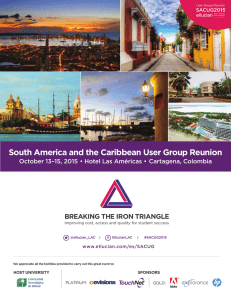details of entrance test – 2016
Anuncio
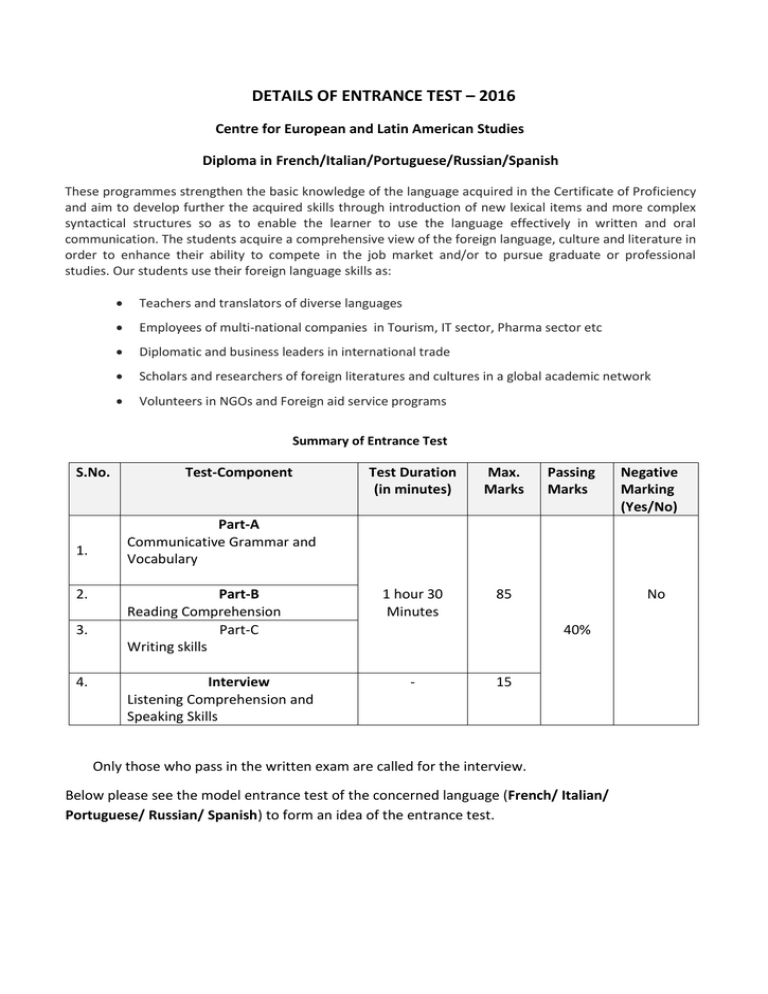
DETAILS OF ENTRANCE TEST – 2016 Centre for European and Latin American Studies Diploma in French/Italian/Portuguese/Russian/Spanish These programmes strengthen the basic knowledge of the language acquired in the Certificate of Proficiency and aim to develop further the acquired skills through introduction of new lexical items and more complex syntactical structures so as to enable the learner to use the language effectively in written and oral communication. The students acquire a comprehensive view of the foreign language, culture and literature in order to enhance their ability to compete in the job market and/or to pursue graduate or professional studies. Our students use their foreign language skills as: Teachers and translators of diverse languages Employees of multi-national companies in Tourism, IT sector, Pharma sector etc Diplomatic and business leaders in international trade Scholars and researchers of foreign literatures and cultures in a global academic network Volunteers in NGOs and Foreign aid service programs Summary of Entrance Test S.No. 1. 2. 3. 4. Test-Component Test Duration (in minutes) Max. Marks 1 hour 30 Minutes 85 Passing Marks Negative Marking (Yes/No) Part-A Communicative Grammar and Vocabulary Part-B Reading Comprehension Part-C Writing skills Interview Listening Comprehension and Speaking Skills No 40% - 15 Only those who pass in the written exam are called for the interview. Below please see the model entrance test of the concerned language (French/ Italian/ Portuguese/ Russian/ Spanish) to form an idea of the entrance test. CENTRE FOR EUROPEAN AND LATIN AMERICAN STUDIES JAMIA MILLIA ISLAMIA MODEL ENTRANCE TEST PAPER-2016 DIPLOMA IN SPANISH The written test will be of 85 marks. It will consist of 3 parts. Part A will contain questions related to grammar and vocabulary in a communicative context. (30 MARKS) Part B will have comprehension passages with questions to be answered. (30 MARKS) Part C will consist of a short essay (80 –100 words) to be written in Spanish. (25 MARKS) IMPORTANT NOTE: This model is only indicative of the language level. The actual test will be longer with more content. Part A Examples: Elige el verbo correcto. Después, conjúgalo en la forma adecuada para completar el texto. Hola a todos, Me gusta mucho mi primer semestre en la Universidad. Mi compañera de piso y yo ______________ (empezar, salir, hacer) del piso muy temprano. Normalmente nosotros ______________ (entender, beber, ir) al gimnasio para hacer ejercicio o a la biblioteca para ______________ (bailar, estudiar, cantar) unas horas. Luego nosotras _________________ (venir, asistir, jugar) al fútbol. Tengo clase ahora. Voy a escribir más mañana. Nos vemos este fin de semana, Julia. Completa con muy, mucho, mucha, muchos o muchas Paula: Hace ____________ deporte. Es ____________ simpática. Tiene ____________ amigos. Es ____________ delgada. No come ____________. ____________ fines de semana se va al campo. Lee ____________ libros de poesía. Imagina que eres un informático (ingeniero de software). Completa este párrafo Soy ________y trabajo en ___________, que está en ___________. Es una profesión muy ____________________porque _______________________. Tiene cosas buenas: _______________________________. Pero también aspectos negativos: ________________________. Mis compañeros de trabajo son ____________________________________. Mi jefe es ________________________. El ambiente en general es ____________________________________. Part B Example of a comprehension passage: Lee el texto y responde a las preguntas. Antonio es un amigo de José. De lunes a viernes tiene la misma rutina. Se levanta a las siete de la mañana, se viste y después desayuna. Va al baño y allí se baña, se cepilla y se peina. Después va al instituto. Normalmente llega a casa a las 6 de la tarde. Los martes y los jueves tiene clases de inglés en una academia de lenguas y llega a casa más tarde, a las siete. En casa juega con el ordenador y hace su tarea. Cena a las nueve con su familia. Después se ducha. Nunca se acuesta después de las once. Los sábados se levanta más tarde, normalmente a las nueve. También se acuesta más tarde, a las doce. 1. 2. 3. 4. 5. ¿A qué hora se levanta Antonio de lunes a viernes? ¿A qué hora vuelve a casa los martes? ¿Qué hace en casa antes de cenar? ¿Los miércoles se acuesta después de las once? ¿A qué hora se acuesta los sábados? Part C Example for the essay: Write a text of around 80-100 words on any one of these topics: - Mi casa Mi familia Mi ciudad
